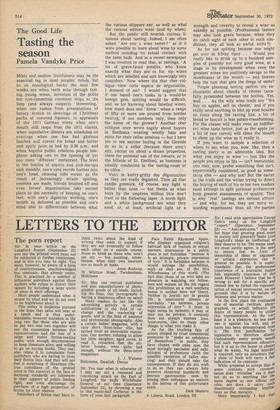Tasting the season
Pamela Vandyke Price
Mists and mellow fruitfulness may be the seasonal tag in most peoples' minds, but to us oenological hacks the next few weeks are when teeth ache through tasting young wines, invention of the polite but non-committal comment stops at the limp (and always suspect) ' Interesting,' when one rushes from presentations of luxury Scotch to showings of Christmas packs of assorted liqueurs, to appraisals of the 1971 German wines when one's mouth still rasps from the 1971 clarets, when superlative dinners are scheduled on evenings when one has had glorious lunches and craves for bread and butter and apple juice in bed by 9.30 p.m., and when hopeful public relations people telephone asking one to the opening of yet one more ' different ' restaurant. The level in the bottles of aspirin and pick-me-ups sink steadily, one's eyes recede further into one's head, cleaning bills mount as the result of increasingly erratic spitting, enemies are made, friends brushed off and even lovers' importunities take second place to the necessity of keeping on one's feet, with one's digestion working, one's mouth as defurred as possible and one's mind able to differentiate between what the various shippers say, as well as what the various editors want (and by when).
But the public still nourish curious illusions about tasting. Indeed, I am often asked Are you a wine taster ? ' as if it were possible to learn about wine by some method avoiding its actual contact with the taste buds. And in a recent newspaper I,was rivetted to read that, at tastings, A lot of grave-faced pundits, who know exactly what they are in for, sip wines which are labelled and spit knowingly into cuspidors.' Now where did that cher collegue view cette espece de cl6gustation, I demand of me? I would suggest that if one bared one's tusks in a would-be benign grin, spitting would be difficult, and, as for knowing about labelled wines, how much does one ' know ' when a range of fifty or more are poured from bottles bearing, if not numbers only, then only the name of the grower ? Another cher collegue once wrote sagely about buyers in Bordeaux wearing woolly hats and mitts for their cellar sessions — but I have yet to see anyone buying in the Gironde do so in a cellar (because there aren't any, except on about a dozen properties, there for personal use of the owners, or in the hillside of St. Emilion), as business is usually conducted in the tasting-room of an office.
Voici le knitty-gritty des degustations as they are really degusted. Then all that candle gimmick. Of course, any light is better than none — but thems as what buys by the umpteen million litre don't trust to the flickering taper. A north light and a white background are what they need, or, at least, artificial light of a strength and ceverity to reveal a wine as nakedly as possible. (Professional tasters may also look grave because, when they do catch sight of each other in such conditions, they all look so awful, nicht ?) As for not spitting because one might get ever so bibtsy tipsy . . . Would you really like to drink up to a hundred samples of possibly not very good wine, at a stage in its development when even the greatest wines are positively savage to the membranes of the mouth — and heaven help the turn that gets the dregs of same?
People planning tasting parties are enthusiastic about chunks of cheese tastefully pyramided between the bottles. Yes, well . . . As the wily wine trade say 'We buy on apples, sell on cheese,' and if you really need anything to blot up your bouche en route along the tasting line, a bit of bread or biscuit is less palate-transforming. For the cheese will make even an indifferent wine taste better, just as the apple (or a bit of raw carrot) will clean the mouth to show up the wine as it really is.
If you want to sample a selection of wines to see what you, now, like, then a tasting party is an admirable idea. But what you enjoy in wine — just like the people you enjoy in life — isn't immutable; you may, now, prefer something that isn't, impersonally considered, as good as something else — and why not? But the taster in the trade and the writer trying to direct the buying of each of his or her two readers must attempt to split personal preferences from general assessments of quality. This is why ' real ' tastings are serious affairs — and why, for me, they are more rewarding experiences than all the parties,










































 Previous page
Previous page